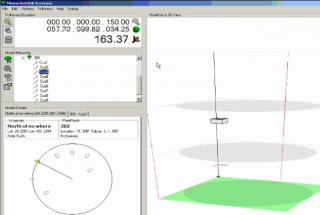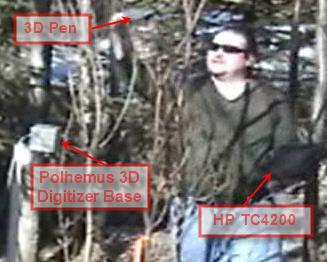|
|
Rationale If
we can connect the CS, LSIS, and BS students into creating the tools
necessary to conduct field studies, we will have accomplished an
important goal of our undergraduate programs: building successful
collaborative and integrative teams. The CS students will learn the
intricacies of software development for a real project with real stakes
rather than a toy project. The LSIS students will learn an
understanding of the steps required to perform research with scientific
rigor. Finally, the BS students will have a valuable tool for
scientific sampling while learning to apply statistical concepts to
ecological communities. This one will go on the resume! - CS A401 Student
|
|
|
Implementation (pedagogy) In
the lecture-based classroom we are using the tablets on both sides of
the classroom. The instructor uses the tablet connected to a projector
in place of the blackboard. We are also using screen-recording software
(Camtasia Studio) to record lectures and place them online as flash
files. The students in the classroom use the tablets to take notes,
easily create and brainstorm designs, and coordinate group work during
breakout sessions. The computers allow individuals to perform their own
work and easily share it with others using OneNote's shared sessions
and other online tools. While
the CS students are using the tablets to create tablet-enabled
software, the BS and LSIS students are using the tablets in the field.
Rather than collect data using pencil and paper, data is collected
directly in electronic format using the tablet and external
digitization devices. This enables validation of the sampling data in
real-time.
|
|

Moose Forage App Screenshot
|
Implementation (technology) Our
model requires interaction between CS, BS, and LSIS students where the
BS and LSIS students and faculty act as clients for the custom software
developed by the CS students. To assist in the cross-disciplinary
communication we have set up project wikis and blogs to inform everyone
of progress, issues, and key developments. The
CS students are using Java, Visual Studio, Visio, and project
management tools to design, implement, and document the software. A
variety of hardware devices have been integrated to create the
field-based data collection application. The herbivore ecology
application is integrating a GPS unit, Mitutoyo digimatic calipers, and
a Polhemus 3D digitizer to sample plant information for moose forage.
The students are using HP TC4200 Tablet PC's to develop and collect
data. We are also using a ruggedized Tablet PC, the Itronix DuoTouch,
for fieldwork in rougher weather conditions. |
|
|
Impact on Teaching The
goal of the software engineering course is to teach students how to
develop medium to large-scale software beginning with requirements
elicitation to testing, deployment, and quality assurance. The HP
technology and collaboration with BS and LSIS provides an ideal
environment to teach these concepts. The
LSIS and BS courses focuses on teaching students how the process of
science works by giving them the opportunity to participate in
authentic scientific research supported by the HP equipment. The value
of research-based learning is that it develops critical thinking and
teamwork skills important in all fields of work.
|
|
|
Current Status The
computer science students have been the focus of the project to date.
In this first year we have focused on developing prototypes for the
data collection software. Since the software needs to be somewhat
mature and stable before the biology and natural science students can
conduct field experiments, a majority of their participation has been
staggered to year two. However, the CS students have been interacting
with biology and physics/astronomy faculty and students to implement
the software. As a result, the CS students have learned valuable
lessons in how research is conducted, how to develop tablet software,
the importance of requirements, and the importance of involving the
client in the software development process. One
major challenge has been scheduling. Our original intent was for the
natural science students to use the software in Spring of 2006 in
collaboration with further development by the computer science students
in the software engineering class. However, the software engineering
class was offered in Fall of 2005, but canceled in Spring 2006 due to
low enrollment. Additionally, the scope of the projects was too large
to fully implement in one semester, which resulted in only partially
working software for the Spring 2006 semester. As a result, we have had
to adjust our schedule for collaboration to Fall 2006 and Spring 2007.
The Moose Forage project is currently the more advanced of the two
projects, as a student completed the majority of the work during Spring
2006 for a capstone course project.
|
|
|

Student testing the biomass data collection system
|
The
tablet and mobile capabilities of the equipment allows real-time data
collection and hypothesis testing that was not possible just a few
years ago. This project also builds upon the expertise of faculty and
students in different disciplines. The collaborative arrangement makes
the project feasible and beneficial for everyone involved.
|
|
|
Impact on Student Learning Two
years ago there was very little collaboration between faculty and
students in the computing, biological, and physical sciences despite
many opportunities. We have made progress in fostering collaboration
with the HP Technology for Teaching grant. Today, we now have CS
students successfully collaborating with biology faculty and students
to create software and implement models to solve real research
problems. The fieldwork-based data collection applications have been
implemented and the prototypes are being tested. Our
assessment tools include student evaluation forms, concept mapping,
laboratory assignments, interviews, in-class feedback, and monitoring
of the usage, content, and degree of collaboration using our online
communication tools. Assessment will also consist of qualitative
feedback regarding the efficacy of the software and the collaboration
process. We
will measure the impact of the project with quantifiable assessment
data by the end of year 2 when the software is deployed in the field
and there is more collaboration between students in the disciplines.
Action Steps from HP2006 Technology for Teaching Conference
Measuring Impact Worksheet from HP2006 Technology for Teaching Conference
|
|
|
Quick Facts Departments: Mathematical Science, Biological Science, Liberal Studies Integrated SciencesCourses
Impacted: CS A401- Software Engineering, CS A470 - Applied Software
Development, LSIS A202 - Natural Science Concepts & Processes, BIOL
A445 - Herbivore Ecology 70 students ImpactedThree Faculty InvolvedThis project is funded in part by an HP Technology for Teaching grant.
|
|

Kenrick Mock
|
Contact Us PI: Kenrick Mock, Ph.D., Computer Science, kenrick@uaa.alaska.edu, (907) 786-1956Co-PI's: Donald Spalinger, Ph.D., Biological Sciences, afdes@uaa.alaska.eduTravis Rector, Ph.D., Physics and Astronomy, aftar@uaa.alaska.edu
|
|
|